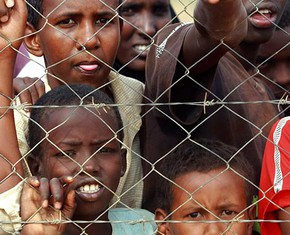The views expressed in our content reflect individual perspectives and do not represent the authoritative views of the Baha'i Faith.
Do you live in a stable country—one stable enough to sustain itself over the long term?
Researchers and political scientists have now categorized the factors necessary to determine the stability of countries. Among them: are citizens free to express themselves, or is the press and social media controlled by the government? Are dissidents allowed to write and speak, or are they harassed, arrested or jailed? Do government services cater to the needs of citizens, or are they indifferent or stuck in bureaucracy? Is the economy well-functioning with the availability of jobs at an acceptable degree, or is there high unemployment and poor educational facilities and training? Is crime low or high? Is there civil unrest, or worse, war?
The Baha’i teachings have a great deal to say on this important subject. In fact, Abdu’l-Baha gave a talk more than a century ago on creating stability in society, in which he said:
The body politic may be likened to the human organism. As long as the various members and parts of that organism are coordinated and cooperating in harmony, we have as a result the expression of life in its fullest degree. When these members lack coordination and harmony, we have the reverse, which in the human organism is disease, dissolution, death. Similarly, in the body politic of humanity dissension, discord and warfare are always destructive and inevitably fatal. All created beings are dependent upon peace and coordination, for every contingent and phenomenal being is a composition of distinct elements. As long as there is affinity and cohesion among these constituent elements, strength and life are manifest; but when dissension and repulsion arise among them, disintegration follows. This is proof that peace and amity, which God has willed for His children, are the saving factors of human society, whereas war and strife, which violate His ordinances, are the cause of death and destruction. Therefore, God has sent His Prophets to announce the message of goodwill, peace and life to the world of mankind. – The Promulgation of Universal Peace, pp. 98-99.
We know that national stability doesn’t come from geographical or population size, as history has repeatedly proven. The world today has 195 defined countries, from the smallest—Vatican City at .44 square kilometers—to the largest—Russia at 17.1 million square kilometers. By population the second smallest, Monaco, has 36,000 residents, while China has over 1.4 billion people.
According to the most recent Fund for Peace report, Finland is the world’s most stable country. That Nordic state was ranked the safest state on Earth, according to the Travel & Tourism Competitiveness Report 2017. As per the 2018 Happiness Report, Finland is also the happiest country in the world, with Norway, Denmark, Iceland, and Switzerland holding the next top positions. Why is Finland ranked the highest—and what can it tell us about our countries? Let’s investigate.
The Republic of Finland is a nation in Northern Europe between Norway to the north, Sweden to the northwest, and Russia to the east. At one time Finland was annexed by Sweden, and in 1809 became part of Russia until declaring independence during the Russian revolution. The capital and largest city is Helsinki. Finland’s population is 5.52 million, with the majority of the population concentrated in the southern region. Almost 90% of the population is Finnish and speaks Finnish. It is the most sparsely populated nation in the European Union.
Finland was a relative latecomer to industrialization, remaining a largely agrarian country until the 1950s. After World War II, the Soviet Union demanded war reparations from Finland, not only in money but also in material, such as ships and machinery. This forced Finland to industrialize. It rapidly developed an advanced economy while building an extensive welfare state based on the Nordic model, resulting in widespread prosperity and one of the highest per capita incomes in the world. Finland is a top performer in numerous metrics of national performance, including education, economic competitiveness, civil liberties, quality of life, and human development.
Finland is a predominantly Christian nation where some 73% of the 5.52 million overall population follow Christianity; the vast majority being members of the Evangelical Lutheran Church of Finland, although 26.3% have no religious belief at all, and 1.6% follow other religions like Islam, Hinduism, Buddhism, Judaism, folk religion etc.
Granted, much of Finland’s peace and stability may be related to its relatively small population and lack of diversity. But that does not take into account the uniform stability of its parliamentary republic within the framework of democracy, its constitution and rule of law, its culture of non-aggression, its compassionate social welfare policies, and its strong mixed economy and emphasis on education. These factors are all highly worthy of emulation regardless of population and available natural resources.
As the Baha’i teachings point out, any country’s happiness, wealth and prosperity, stability and security, depend on the quality of its moral values and norms based on spiritual, cooperative principles and not divisive, hard-hearted policies. The unity of any nation, then, provides its stability. The Universal House of Justice, in its introduction to Baha’u’llah’s Most Holy Book, wrote:
Our world has entered the dark heart of an age of fundamental change beyond anything in all of its tumultuous history. Its peoples, of whatever race, nation, or religion, are being challenged to subordinate all lesser loyalties and limiting identities to their oneness as citizens of a single planetary homeland. In Baha’u’llah’s words: “the well-being of mankind, its peace and security, are unattainable unless and until its unity is firmly established.” – p. 11.
The example of Finland and other countries shows that unity of thought and action, the exercise of moral values and cooperation, putting citizens’ welfare first and other factors, proves that a country can achieve happiness and stability even in a chaotic world. If we put these spiritual ideals first, and seek unity rather than division, we can also achieve it in our own country. All things are possible with God’s help—this is the message of Baha’u’llah, and of all religions.
















Comments
Sign in or create an account
Continue with Googleor